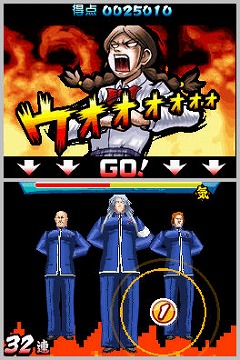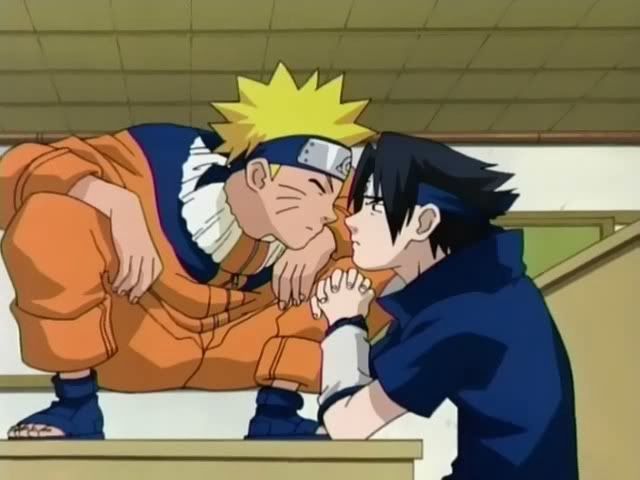 Jeff's entry
Jeff's entry the other day about the difficulties in speaking Japanese as a non-native touched on a lot of issues that, I think, most people eventually hit in their studies of Japanese, probably more than any other language. Why? Regardless of whether you agree with them or not, it seems the vast majority of people raised in Japan believe that there is something
biological about the cultural aspect of Japanese language that renders it incomprehensible to non-natives.
Personally, I don't want to get into a long discussion about culture and cultural differences (which I think are vastly overplayed, although certainly not something you can easily discount). What I do want to go into is why I think it's a travesty that so many people fall into, and at times end up perpetuating, the myth that the cultural differences facing us NN's (non-natives) are insurmountable.
Plus I like to 1) show off how much I know and 2) use the fact that it was my birthday to force Jeff into letting me write a guest post.
Let's start by considering the example sentence that Jeff gave us, which a Japanese person informed him was "grammatically correct, but not what a Japanese person would say." I don't know exactly what the person said in Japanese, but I imagine something along the lines of "文法は間違っていないけど日本人はそんなことを言わない。" (or, since he lives in Saga, 文法のおうとっとばってんが、日本人そぎゃんこついわんたい!)
Actually, regardless of how much Japanese girls may go crazy over it, Jeff's bunpo was incorrect here. Since we're all nerds to some extent here, I'm going to pull those proof-reading terms from 7th grade (your grade-age may vary). This is what we would call, in English, a diction error. The specific Japanese term for diction is 語彙
goi. Considering how people almost never consider a diction error the same thing as a grammar error in Japanese, I almost said that the two are completely discrete concepts in our 2nd (or 3rd or 4th) language of choice; on second thought, thinking of the unenviable grammatical skill of the average native speaker of any language lacking other linguistic qualifications, I'm going to withhold judgment. Nevertheless, Jeff's example sentence was not in the truest sense correct, and this is another example of native speakers not always knowing their language as well as one might assume. Confusion between sentences with correct grammar that simply aren't said in Japanese and those whose grammar, or specifically their diction, are incorrect is far too common, and its much easier to write all of this confusion off as "文化の違い" than to really think about it. (Just like the landlord who is afraid of his tenants cooking with oil, or the gaijin who claims "I used perfect Japanese and the guy pretended not to understand me!") That's because this excuse allows you to not really think about
why a given sentence is incorrect (just like the landlord might realize, after a little thought, that Japan is, after all, the land of foods like katsu, kara-age, and tenpura, and like the gaijin might realize that, well, he talks like a gaijin and no one can understand wtf he's saying).
Fine, you say, but that's just one example sentence. We've all had multiple experiences with the "Nihonjin ha sonna koto iwanai," and I don't mean to discount them all, just most of them, which are purely questions of diction.
Whats a legitimate "sonna koto iwanai?" Let's consider Jeff's other example about (and I can just see this happening) someone who's prejudiced and poorly thought out comments are reflective of their lack of brains. I think this is the perfect example for me to explain how I feel on the subject.
There is nothing about this sentence that renders it unspeakable in all cases in Japanese society. There are just two ways to arrive at it.
The first is the direct route. My translation of Jeff's sentence (with some allowances for 流れ): あなたの言ってることは間違ってると思う。あなたのその間違った考え方は、あなた自身の愚かさか、故意的な無知さを示している。
Do most people say this exact thing, in these exact words? No, certainly not. There is the obvious problem of having to change politeness levels and certain usages depending on your age and social station. More importantly, you can be pretty sure that whoever you say this to won't be happy about it, so you'd have to be quite prepared to 縁を切る
(en wo kiru) with, or rather 縁を切られる
(en wo kirareru) by this person, but isn't that true of saying the same thing in English? Aren't you actually better off in Japan, because, let's face it, you're more likely to get punched in the balls for your rudeness in the US than you are in Japan (my apologies to any non-US English speakers who may be reading this, but your ways are far more difficult for me to comprehend than those of Japanese people. I mean seriously, guys, 'flav
our'? Would you like some balswet with your Francified spelling?)
Now consider the second way to the same meaning. This involves changing the words, obviously, to the point where you can't directly reverse translate to get the same English anymore. I don't have a problem with this and don't see why this necessarily has to mean that we are talking about a completely different sentence. Yes, you have to make an allowance for the more 縦
tate nature of Japanese society (and this is where I will make a concession when it comes to "bunka no chigai"), but a Japanese literate listener who allows that you have a certain amount of literacy will understand your meaning, and the disdain behind it.
Aye, there's the rub. As a foreign speaker of Japanese, you're going to have a hard time being ascribed fluency in Japanese. The same person who asks me to teach their children kanji will turn around and wonder at the fact that I can read the characters for 'ichi,' 'ni,' and 'san.' But kanji, and Japanese in total, are by no means easy, and certainly not as easy our bravado sometimes may make them out to be. So I don't doubt the intentions of the Japanese person who assumes that I can't speak Japanese (yes, I'm only human, and in real life I get as angry or more so when brushed off for my gaijin-ness). I do, though, think that the illiteracy assigned to us as foreign-born speakers is the biggest bunka no chigai that keeps our Japanese from being as
effective if not as correct as we may want it to be.
But how many of us really have that language literacy on a consistent level? I'd wager not that many. So let's not get ahead of ourselves, because we all still make "diction" mistakes, sometimes even at Saga Jinja.
PS Jeff, since I've given you so much crap on this post, here's a gift. 勃起気味. It works.
Jinja jinja~, jinja jinja jinja~





















